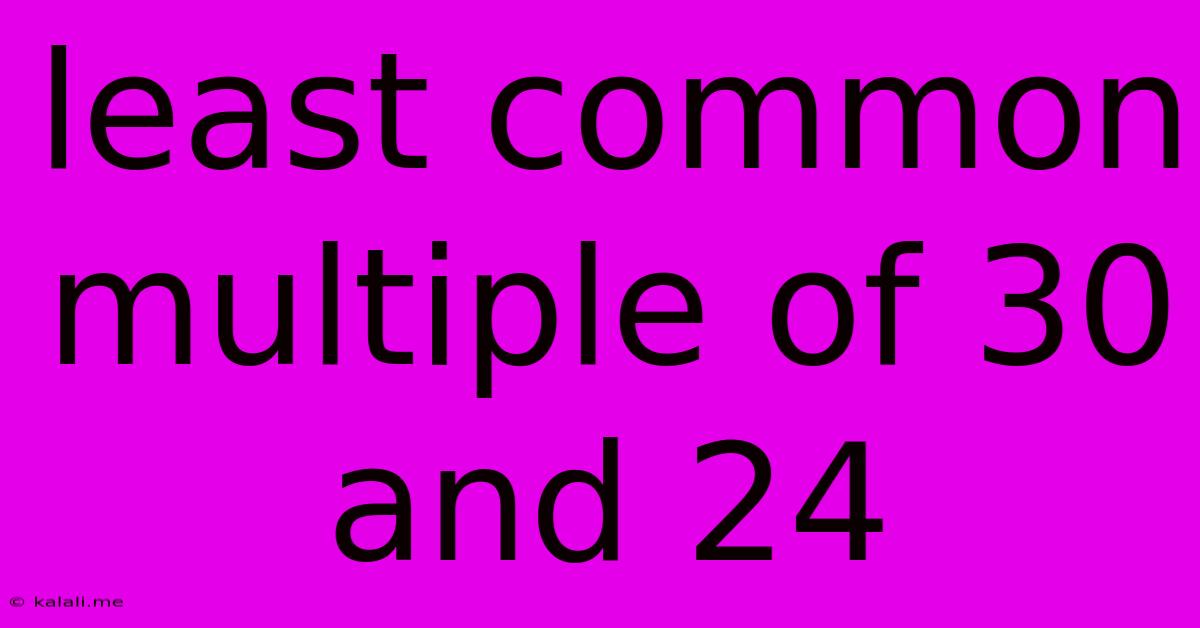Least Common Multiple Of 30 And 24
Kalali
May 10, 2025 · 3 min read

Table of Contents
Finding the Least Common Multiple (LCM) of 30 and 24: A Comprehensive Guide
Finding the least common multiple (LCM) of two numbers is a fundamental concept in mathematics with applications ranging from simple fraction addition to more complex scheduling problems. This article will guide you through different methods to calculate the LCM of 30 and 24, explaining the process in a clear and concise manner. Understanding LCM is crucial for various mathematical operations and problem-solving scenarios. This guide will equip you with the knowledge and techniques to confidently tackle such calculations.
What is the Least Common Multiple (LCM)?
The least common multiple (LCM) of two or more integers is the smallest positive integer that is divisible by all the integers. In simpler terms, it's the smallest number that both numbers divide into evenly. For example, the LCM of 2 and 3 is 6 because 6 is the smallest number divisible by both 2 and 3.
Method 1: Listing Multiples
One straightforward method to find the LCM is by listing the multiples of each number until you find the smallest common multiple.
- Multiples of 30: 30, 60, 90, 120, 150, 180, 210, 240...
- Multiples of 24: 24, 48, 72, 96, 120, 144, 168, 192, 216, 240...
By comparing the lists, we can see that the smallest common multiple is 120. Therefore, the LCM of 30 and 24 is 120. This method works well for smaller numbers but can become cumbersome for larger numbers.
Method 2: Prime Factorization
A more efficient method, especially for larger numbers, is using prime factorization. This involves breaking down each number into its prime factors.
- Prime factorization of 30: 2 x 3 x 5
- Prime factorization of 24: 2 x 2 x 2 x 3 (or 2³ x 3)
To find the LCM using prime factorization:
- Identify the highest power of each prime factor present in either factorization. In this case, we have 2³ (from 24), 3 (from both 30 and 24), and 5 (from 30).
- Multiply these highest powers together. 2³ x 3 x 5 = 8 x 3 x 5 = 120
Therefore, the LCM of 30 and 24 is 120, confirming the result from the previous method. This method is generally faster and more efficient for larger numbers.
Method 3: Using the Greatest Common Divisor (GCD)
The LCM and the greatest common divisor (GCD) are closely related. You can calculate the LCM using the following formula:
LCM(a, b) = (|a x b|) / GCD(a, b)
First, we need to find the GCD of 30 and 24. We can use the Euclidean algorithm for this:
- Divide 30 by 24: 30 = 1 x 24 + 6
- Divide 24 by the remainder 6: 24 = 4 x 6 + 0
The GCD is the last non-zero remainder, which is 6.
Now, we can calculate the LCM:
LCM(30, 24) = (30 x 24) / 6 = 720 / 6 = 120
Again, the LCM of 30 and 24 is 120. This method is particularly useful when dealing with larger numbers where prime factorization might be more complex.
Conclusion
This article demonstrated three different methods to calculate the least common multiple of 30 and 24. Choosing the most efficient method depends on the size of the numbers involved and your comfort level with different mathematical techniques. Whether you opt for listing multiples, prime factorization, or using the GCD, the final answer remains consistent: the LCM of 30 and 24 is 120. Understanding these methods equips you with versatile tools for solving a variety of mathematical problems involving LCM.
Latest Posts
Latest Posts
-
How Many Days In A Million Minutes
Jul 14, 2025
-
How Many Days Is In 11 Weeks
Jul 14, 2025
-
How Many Grams Are In One Tola Gold
Jul 14, 2025
-
How Many Oz In A Pound Of Freon
Jul 14, 2025
-
How Many Years Are In A Millennia
Jul 14, 2025
Related Post
Thank you for visiting our website which covers about Least Common Multiple Of 30 And 24 . We hope the information provided has been useful to you. Feel free to contact us if you have any questions or need further assistance. See you next time and don't miss to bookmark.